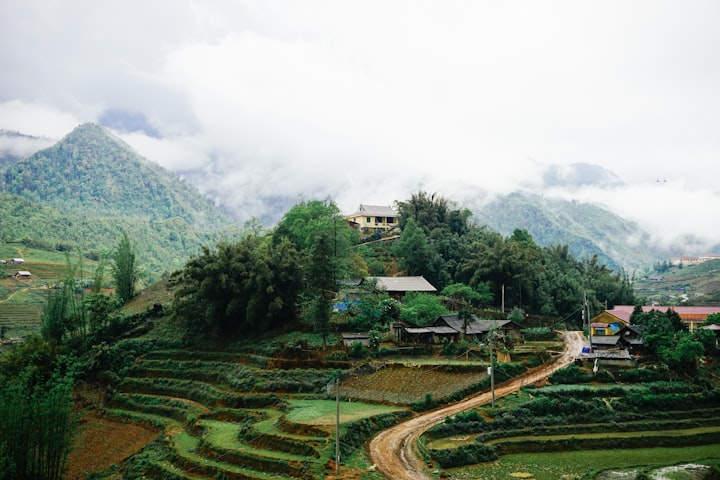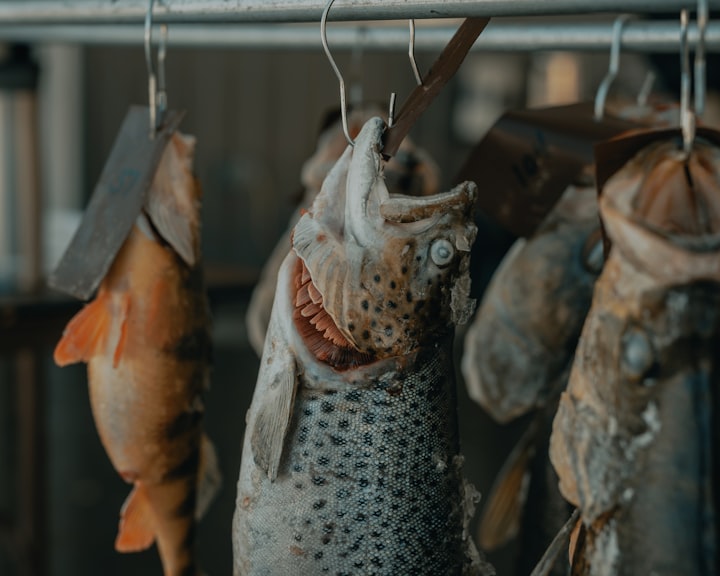
Angry clouds obscured the sun. Rain fell in sheets across the leaf-littered, dirt sidewalks, overflowing the gutters. Bare feet trampled through the muddy water, sending murky droplets through the air. In lower areas, the water was waist-high, enough to drown a small child, enough to collapse a home. Luckily, their village was built on a hillside, and the water hadn’t reached that high yet.
Neighbors clearing the clotheslines stepped through a garden graveyard of churned soil and trampled herbs. Forgotten clothes flapped wildly in the gusts, possessed by incensed spirits.
Perhaps the god of destruction was upset. Perhaps he wanted to destroy their homes. The homes made of dirt and mud, with thatched roofs and empty windows. The overcast sky felt closer to the earth, more intimate despite its moody color, like a father looming over a child. Protective, destructive.
She shivered in her thin veil. All but her calloused hands were covered in muslin. Her palms were warmed by the clay mug she grasped. The dark liquid inside was calm and still, belying the haphazard mixture of spices that had been thrown in experimentally. Various aromas fought in the small kitchen, but she hardly noticed.
She had only tasted coffee once before. When the blonde lady in the nice hotel made her some in a pristine silver pot. The coffee was poured into a mug with the words “Break the Silence” on it, then placed in front of her alongside a thin slice of chocolate cake. The white lady had tried to talk to her, but she'd been too focused on the strangeness of the drink. Unlike the cake, which was dry and bland compared to their traditional desserts, the coffee had a unique bitterness that left her wanting more. It filled her mouth with a rich earthiness. A kind of bitter sweetness that lingered.
Watching the rain form dirt-colored pools outside, she recollected the foreign episode from three years ago.
The blonde lady had introduced herself as Sarah. “I work with a global organization for women and children. I look out for those who need help,” Sarah said, her blue eyes peering over her mug to momentarily rest on her guest’s deep brown ones.
She said nothing, though she felt uncomfortable. Why was the white lady telling her that? They had met the day before at the open market. She’d seen Sarah struggling to bargain with the shrewd fruit vendor and had stepped in to help with her limited English. Sarah said she was staying at a nearby hotel and invited her over for afternoon tea—to express her gratitude and to learn more of their native tongue. She'd agreed hesitantly, drawn by the light-haired foreigner and the way English words tumbled musically from her smiling lips.
But Sarah seemed more interested in her than their language. “Do you live in the southern villages?”
“No, the one on the hill.”
“Oh, that’s nice. Do you like your home?”
“Yes.”
“Do you live with your parents?”
“No, just my papa.”
“He must work hard for you to live on the hill. Is that right?”
She didn’t know how to answer that. It was actually her mama’s home after her grandparents had passed away. But her mama was now gone as well.
Sarah asked more questions about her home, her father, whether she had siblings. She felt a flush creeping up her neck. She wasn’t used to talking about her family. So she sipped her drink, stared at the words on the mug, and wondered why she was sitting in a stranger’s room. The bruises on her neck were almost gone. She had gained weight in the last month. But it had been a while since she had felt warm. Her stomach was doing a slight dance at the hot liquid.
Something the white lady said had finally broken through her coffee reverie.
“Do you love your father?” She paused and added, “Does he love you?”
Why was she asking? Of course papa loved her. After her mama had died, he had started to drink more, but every day, he still went to the construction sites to find odd work. She had to drop school because papa wanted a capable woman at home, but she was happy to be useful. Papa liked his meals hot when he came home.
“Yes, of course.”
“I’m glad. Where I’m from, it is good for fathers to be tender and loving towards their little girls. What is your father like?”
Her papa was a quiet man. He didn’t like talking over his meals. He didn’t talk much to her at all. Especially when he couldn’t find work. On those days, he would come home early, and an impenetrable silence would descend upon the small dirt hut.
Other times, papa would come home drunk. That happened when he found work with some old friends. They would celebrate after, papa told her, and he would brag about his pretty daughter. That made her happy, because she knew papa had wanted a son. He had told her as much himself. A son was more useful, more valuable than a daughter.
Then there were the days when he couldn’t find work and still came home drunk. The first time it happened, she had not yet prepared dinner. Papa was so angry, his mustache had quivered. He grabbed her wrist and thrust her against the dinner table. His face was close, so close that she could almost taste the alcohol on his breath. Sickly sweet, it tasted like bile. He slammed her head into the wall, and the pain was so sharp, she felt momentarily weightless.
Later, she did taste bile. And papa was sorry. And whenever he was sorry, he was tender. He asked to see where she was hurting. Once, after he belted her, he cried and asked her to show him the bruises. She removed her muslin wrap, and he caressed her. Sometimes, he whispered words to her, words that made her feel like this was their secret. That his love for her was a secret. So yes, her papa loved her, and he was tender, but she wouldn’t tell the white lady.
“Your English is good. Do you go to school?”
“No.” After a pause, she added, “I learn enough.”
She wanted to go, of course she did, but papa wouldn’t allow it. He said school and books were a distraction. So she hid her books and read only when her chores were complete. To her, words were puzzles, and each letter a puzzle piece. They didn’t always fit on her tongue, but when they did, they made the most delightful sounds. Sentences were mazes; sometimes she found her way through them, and other times she got lost reading them over and over.
One night, papa came home early and caught her reading. He had brought a friend over for dinner. His mustache quivered when he saw the empty dinner table, but he said nothing. His friend, a middle-aged man named Ivaan, laughed and clapped papa on the back.
“What a daughter you have, brother! Very intelligent, no? She would rather stick her nose in a book than attend to us.”
Papa had reddened. Before he could say anything, she ducked into the kitchen to bring out their meals. Her heart pounded in her chest. She had humiliated him in front of his friend.
After both papa and Ivaan had some to drink, they grew merrier. At one point, papa clapped Ivaan on the shoulder and exclaimed, “Look here, brother, don’t you worry about the reading. Her cooking isn’t bad, see?”
Papa pointed to where she sat in the kitchen. “Ay, she’ll make a fine wife one day. Her mother was a beauty. Give her some time, a little more to eat, and she’ll fill out that bony frame.”
Ivaan laughed again, an unpleasant laugh like the creaking of a door on rusty hinges. She didn’t like his squinty eyes, the way they traced the hidden curves of her body. She stayed in the kitchen the rest of the evening, and when papa went to bed early, she breathed a sigh of relief.
But papa didn’t forget. The next day, he threw her books out and trampled them in mud. She had never cried harder. As if her tears could wash the dirt off the stained pages. But it was for her good. Books were useless. They would not make her more useful, more worthy of his love.
So when the white lady asked if she would like to borrow one of her books, she bit her tongue so hard, she tasted the bitter acidity of blood and coffee mingling.
“No, I have to go.”
“Why don’t you take a look? I have many books suited for—”
“No, thank you. I go now.”
She couldn’t stay any longer. If papa found out… And yet, she wondered whether papa finding out might not be such a bad thing. There was more work as of late from all the building projects, and he had less time to drink and see his friends. Every night, he came home after dark, weary and stone-faced. The silence was more unbearable than his outbursts. At least he acknowledged her in his anger. At least his rage was followed by tenderness and warmth. And in that tenderness, she could forget the pain. The pushing, the choking, the lashing. She could forget the taste of bitterness and savor only the sweetness of being held.
It wasn’t until she was out of the hotel that she realized she had forgotten to ask the lady what her drink was made of. Its sweet aftertaste lingered on the back of her tongue.
Three years later, she still remembered the musty aroma of the dark liquid. The drink she now held was nowhere close. She had tried to introduce various spices to their traditional tea, but she couldn’t replicate the bitterness or the aftertaste. No one in her village knew what she was talking about.
She rested her hand on her growing stomach. The rain outside was letting up. The sky no longer hovered close. Through the clouds, she could see a glimmer of the setting sun. She glanced longingly at the open book on the table; she had just one more chapter to finish. But Ivaan would be home soon, and she had dinner to prepare. Unlike papa, Ivaan didn’t care whether or not she read, as long as the house was in order.
She never saw Sarah again after that afternoon. A few days later, papa had sent her to live in a new city, a new village on a hill. Ivaan told her that he was doing an old friend a favor, that her papa had gotten a good bargain for her, and that she had better bear him a son.
It was better for her child to be a boy. It was useful for a boy to learn to read, to go to school, to take a job. Yes, a boy would be happier in this world.
But she wondered if she would love a daughter more. If she would hug her more tenderly and call her beautiful. If she would hide books for her or even teach her to read.
She shuffled heavily to the doorway. The rain had stopped. Two children, a boy and a girl, stood flying kites on a nearby rooftop. The kites, thin, brightly colored sheets of paper, fluttered in the wind. Flutter, flutter, as they tried to leap higher. The little girl laughed with delight as her kite soared through the air.
A raindrop fell as she tilted her face up. It tasted like coffee, and she smiled to herself. No, it wouldn’t matter if her child were a girl. She would give her everything she never had, everything that she craved. And even with bitterness, there would be sweetness.
She poured the rest of her cup outside and watched as rivulets of rainwater carried it away.
About the Creator
Lilia
dreamer of fantasy worlds. lover of glutinous desserts.
twitter @linesbylilia






Comments
There are no comments for this story
Be the first to respond and start the conversation.